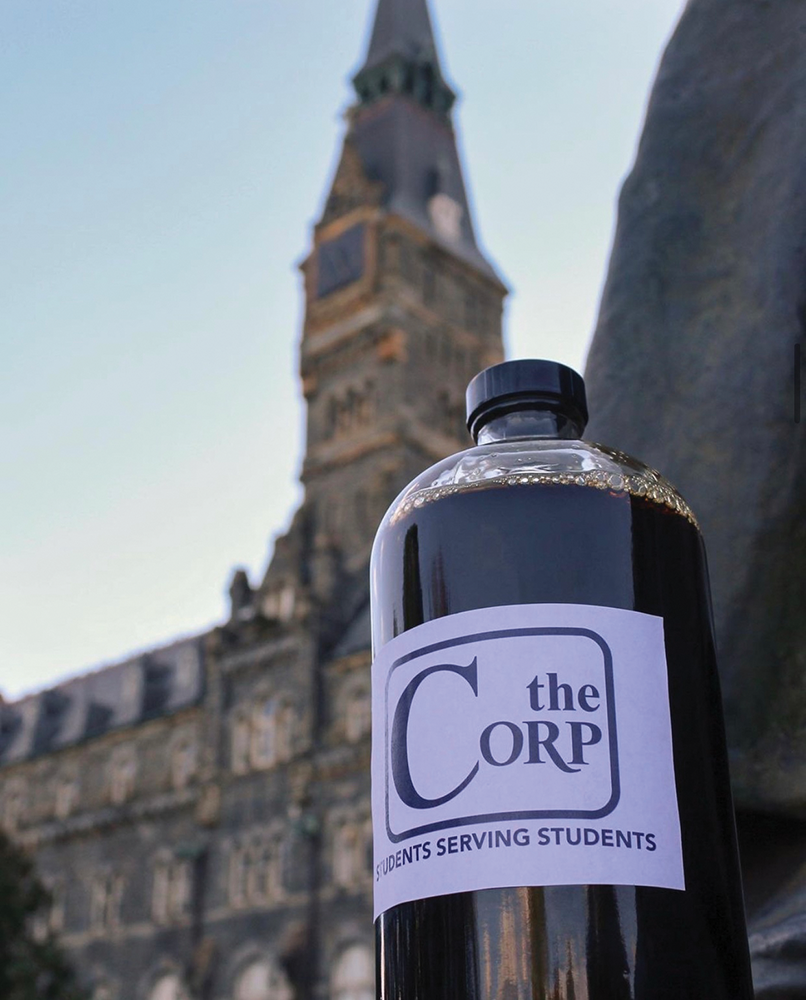Georgetown University students are now able to donate unused meal plan money to be redistributed in order to combat food insecurity on campus through mutual aid efforts.
Georgetown Mutual Aid, a student group established in 2020 to help distribute funds to students in need, is collaborating with the student-run nonprofit The Corp to provide students with greater access to food through the reallocation of Flex dollars, which can be used at many of Georgetown’s dining services.
Students can indicate an amount of Flex dollars to donate through a Google Form, and The Corp will charge that amount to the student’s account and hold it in an account of funds to be redistributed, according to Rose Dallimore (SFS ’22), community engagement chair and board member at large of The Corp. Students can request funds through another form, and The Corp redistributes the collected Flex dollars raised. Students can use donated Flex dollars for groceries, food and coffee at The Corp Café, a breakfast and coffee shop in the Healey Family Student Center.

The Corp’s ability to hold Flex dollars presented a chance to work together to achieve the vision of Georgetown Mutual Aid, according to Dallimore.
“We saw an opportunity to use their structure, our capacity for flex collection, and the only Corp service which is currently open — The Corp Café at the HFSC — to combat food insecurity and serve the on-campus community,” Dallimore wrote in an email to The Hoya.
A 2016 survey conducted by the Georgetown University Student Association found that 54 percent of the 351 students surveyed had experienced food insecurity during their time at Georgetown, and two-thirds of those students received need-based financial aid.
Additional stressors, such as the COVID-19 pandemic or financial concerns, often heighten food insecurity, according to Dallimore.
“The need for the drive is the unfortunate reality that even with support resources from the university, many students still do struggle with food insecurity,” Dallimore wrote. “Individual circumstances, such as dietary and COVID-based restrictions and personal, financial and familial stressors may produce scenarios where students require extra support.”
The redistribution program offers a solution to food insecurity and also encourages aid within the Georgetown community, according to Dallimore.
“Opening up dining options further and sourcing Flex donations is an accessible way to promote community mutual aid without requiring students to pay out of pocket,” Dallimore wrote. “Rather, asking them to donate the Flex that we were required to have in our meal plans by the university, which in many cases, is going under-used.”
Students have desired to donate Flex dollars to Georgetown Mutual Aid before, but funds could not be held past the end of the semester without The Corp’s help, according to Binqi Chen (NHS ’22) and Megan Huynh (NHS ’22), co-founders of Georgetown Mutual Aid.
“Having an official partnership through The Corp where they have previously done similar work helps to facilitate this process and ensure that any donated money is being completely utilized,” Chen and Huynh wrote. “Because FLEX expires at the end of the semester, our partnership with The Corp is a way to get around that deadline because The Corp is able to store that money indefinitely in order to be used later on.”
Since Feb. 22, the Georgetown Mutual Aid Network has raised $495 in Flex and has redistributed $320 of it to 15 students, according to Chen and Huynh.
Students living on campus raised prior concerns over food resources after the university required all students living on campus this semester to purchase the All Access 7 meal plan, which includes $200 in Flex dollars. Students argued they should not have to pay for the plan if there are cheaper alternative food options.
The university is working to help students suffering from food insecurity in a variety of ways, including through the Hoya Hub, an on-campus food pantry open to students, according to a university spokesperson.
“Georgetown is committed to supporting students with food insecurity and the University meets the full needs of students who require financial assistance paying for college, including tuition, housing and meal expenses. For the duration of the COVID-19 pandemic Georgetown has supported students with housing and food insecurity on campus,” the spokesperson wrote in an email to The Hoya. “As the food pantry continues its operation, we will also continue broader dialogue about food insecurity across our campus so we can ensure the university is addressing the needs of community members seeking additional food resources.”
Although the Flex Fund began during COVID-19, The Corp and Georgetown Mutual Aid both see it as a long-term resource for students, according to Chen and Huynh.
“As long as students have a need for this resource, we will continue to use this as an avenue for mutual aid. However, whether it remains in the same format as it does now is something that is subject to change,” Chen and Huynh wrote. “Our main goal is to make sure that students are taking care of their peers and that all our community’s needs are met.”




















